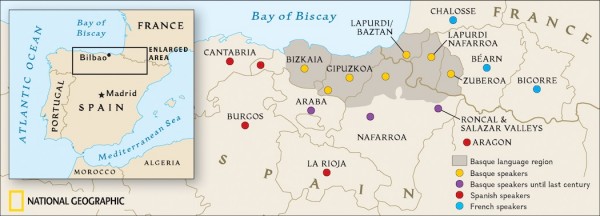This article was translated by John R. Bopp
Basques don’t have any relevant genetic differences with Spaniards. That’s what was published just over two years ago by Spanish newspapers, with thinly-veiled ideological delight behind the use of the scientific terminology. It was a study that had been performed at the Pompeu Fabra University in Barcelona. When the story broke, we got headlines like this:
Público – Sept 19, 2010
Los genes de los vascos no son diferentes (Basque genes are not different)
(Continue) (Automatic Translation)
Levante -Feb 22, 2012
Los valencianos tienen más diferencias genéticas con los españoles que los vascos (Valencians have more genetic differences with the Spanish than the Basques do)
(Continue) (Automatic Translation)
And all this, just two years after the Genographic Project, sponsored by the National Geographic Society, reached diametrically opposed conclusions:
The Genographic Project announced today the most comprehensive analysis to date of Basque genetic patterns, showing that Basque genetic uniqueness predates the arrival of agriculture in the Iberian Peninsula some 7,000 years ago. Through detailed DNA analysis of samples from the French and Spanish Basque regions, the Genographic team found that Basques share unique genetic patterns that distinguish them from the surrounding non-Basque populations.
In the Genographic Project’s press release, they even explain how a deeper, more detailed study was needed to detect this data and supercede earlier, erroneous conclusions:
It is a perfect example of why insisting and persisting on accuracy and the deepest possible phylogenetic analysis is a standard to be followed. We simply could not detect the signal in a lower level of resolution — it may have even led us to a completely opposite conclusion.
The study has been published in the American Journal of Human Genetic, and can be consulted at their website, behind a paywall.
We discussed similar news before, which even reached the same conclusions. We don’t know if they might be a part of the study we’re talking about today.
In any case, we’ll keep an eye out to see if, on this occasion, the Spanish media decide to dedicate the same page space and interest they had two years ago to inform their readers of these new conclusions. We’ll be keeping an eye out, but we’re not holding our breath. This news will undoubtedly die away, meaning that in the collective imagination of the Spanish the idea, so celebrated by many of them, that the Basques’ being different is only an idea that Sabino Arana and his separatist boys came up with will remain.
National Geographic – 6/3/2012 – USA
Basque Origins Predate Arrival of Farmers in Iberian Peninsula, DNA Analysis Finds
Comprehensive analysis of Basque genetic patterns has found that Basque genetic uniqueness predates the arrival of agriculture in the Iberian Peninsula some 7,000 years ago, the Genographic Project announced today. “Through detailed DNA analysis of samples from the French and Spanish Basque regions, the Genographic team found that Basques share unique genetic patterns that distinguish them from the surrounding non-Basque populations,” Genographic said in a news statement. The Genographic Project seeks to chart new knowledge about the migratory history of the human species and answer age-old questions surrounding the genetic diversity of humanity. The project is a nonprofit, multi-year, global research partnership of National Geographic and IBM with field support by the Waitt Family Foundation.
(Continue) (Automatic Translation)
—————————–
Medical Xpress – 6/3/2012 – USA
Basque roots revealed through DNA analysis
Published in the American Journal of Human Genetics, the study was led by Lluis Quintana-Murci, principal investigator of Genographic’s Western European regional center. “Our study mirrors European history and could certainly extend to other European peoples. We found that Basques share common genetic features with other European populations, but at the same time present some autochthonous (local) lineages that make them unique,” said Quintana-Murci. “This is reflected in their language, Euskara, a non-Indo-European language, which altogether contributes to the cultural richness of this European population.”
(Continue) (Automatic Translation)
—————————–
American Journal of Human Genetics -23/2/2012 – USA
The Basque Paradigm: Genetic Evidence of a Maternal Continuity in the Franco-Cantabrian Region since Pre-Neolithic Times
Different lines of evidence point to the resettlement of much of western and central Europe by populations from the Franco-Cantabrian region during the Late Glacial and Postglacial periods. In this context, the study of the genetic diversity of contemporary Basques, a population located at the epicenter of the Franco-Cantabrian region, is particularly useful because they speak a non-Indo-European language that is considered to be a linguistic isolate. In contrast with genome-wide analysis and Y chromosome data, where the problem of poor time estimates remains, a new timescale has been established for the human mtDNA and makes this genome the most informative marker for studying European prehistory.
(Continue) (Automatic Translation)
Last Updated on Dec 20, 2020 by About Basque Country






